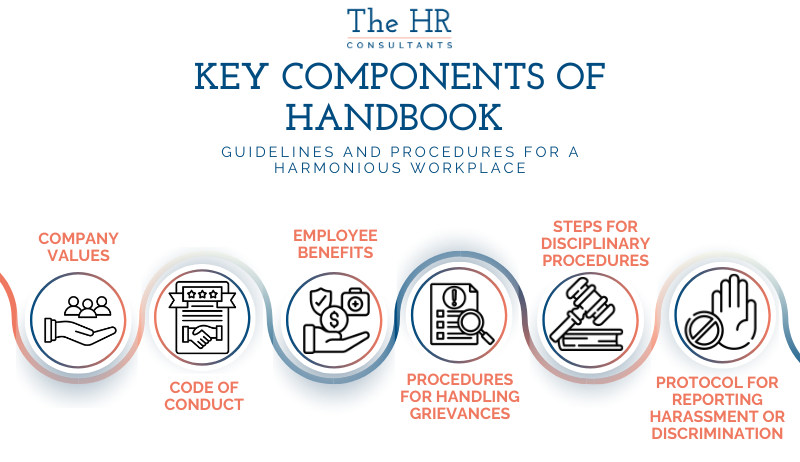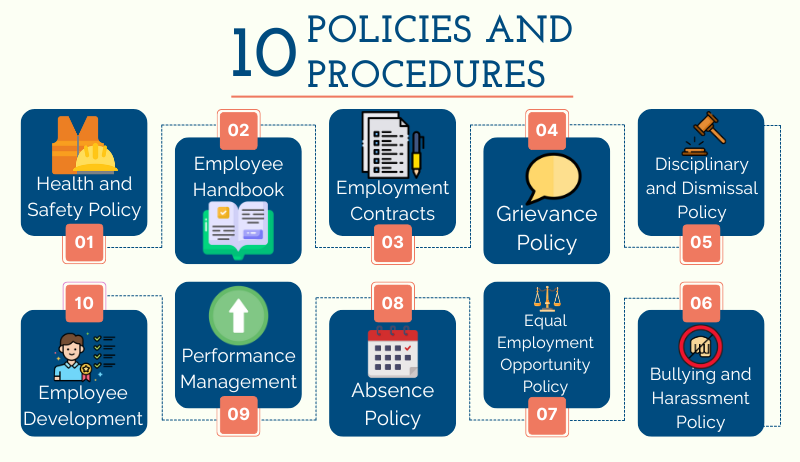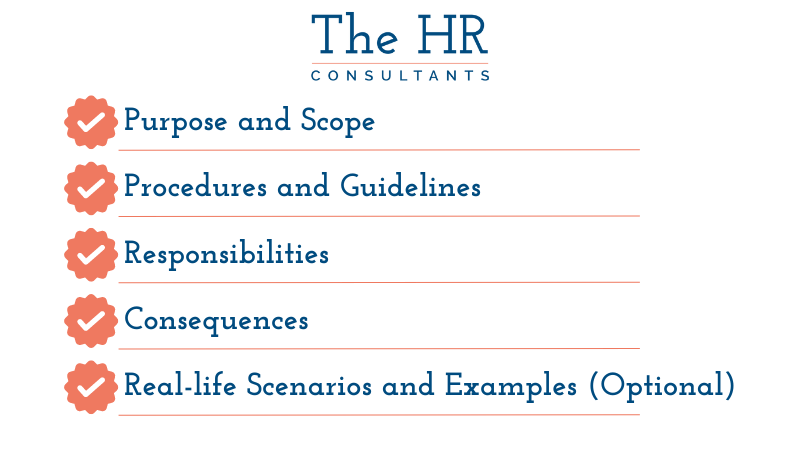"
Imagine running a small business without clear guidelines for managing employees. It would be like trying to sail a ship without a compass.
HR policies are not just bureaucratic necessities; they are the framework that keeps your business steady and your team productive. They set the stage for a positive work environment, ensuring everyone knows their roles and responsibilities.
Small businesses often overlook the importance of well-defined HR policies. This can lead to confusion, decreased productivity, and even legal troubles. Whether you’re a start-up or an established small business, having robust HR procedures and policies is essential. These company policies help you comply with employment laws, maintain a safe workplace, and cultivate a positive company culture.
[addCTA blink=""/services/hr-services-for-small-business/"" title=""Overwhelmed by HR for your small business? Let us handle it.""]
We are The HR Consultants, a leading HR consultancy in the UK specialised in helping businesses develop and implement effective HR policies. With our expertise, you can navigate employment law and create a harmonious work environment like no other.
But first, we want you to truly understand every aspect of HR policies and their integration in your small business. Let's get to it!

Table of Contents
Essential HR Policies and Procedures
- Health and Safety Policy
- Employee Handbook
- Employment Contracts
- Grievance Policy
- Disciplinary and Dismissal Policy
- Bullying and Harassment Policy
- Equal Employment Opportunity Policy
- Absence Policy
- Performance Management
- Employee Development
Implementing HR Policies
Embracing Technology
Bringing It All Together: HR Strategies for Growth
Frequently Asked Questions (FAQs)
Essential HR Policies and Procedures
From health and safety to career development, comprehensive HR policies are essential for adhering to employment legislation and managing your workforce efficiently. So what are the best HR policies for small businesses?
Below, we explore ten key HR policies that every small business should implement to establish a solid foundation and support their team's growth.
The policies are numerous but do not be discouraged, as we're walking you through them individually and in great detail.
Health and Safety Policy
Adhering to health and safety regulations not only protects employees but also shields your enterprise from legal issues.
According to UK law, businesses must comply with the Health and Safety at Work Act 1974, ensuring that workplace hazards are minimised and that safety procedures and protocols are followed.
Creating Your Health and Safety Policy
Start by identifying potential hazards in your workplace, and make sure to engage your employees in this process. After all, they are the ones on the front lines.
Document your findings and outline your best practices and procedures to address these hazards. Regular safety drills and training sessions should be a part of your policy to keep everyone prepared and informed.
Employee Handbook
An employee handbook serves as the go-to manual for your employees. It provides detailed information on company policies, procedures, and expectations. This document is critical in ensuring that everyone is on the same page and understands their roles and responsibilities.
Key Components
Your handbook should include sections on company values, code of conduct, and employee benefits. It should also outline the procedures for handling grievances, the steps for disciplinary procedures, and the protocol for reporting harassment or discrimination. This handbook helps in maintaining order and also serves as a legal document that can protect employees and your business in case of disputes.

Employment Contracts
These are legally binding documents that outline the terms and conditions of employment.
There are various types of contracts, including permanent, temporary, and zero-hour contracts. Each type has its own set of rules and benefits, and choosing the right one depends on your business needs and the nature of the job.
Legal Requirements and Protections
Ensure that your contracts comply with UK employment law. This includes providing written terms within two months of the start date as well as outlining job responsibilities, salary, working hours, and notice periods. Properly drafted contracts help prevent misunderstandings and provide a clear framework for the employer-employee relationship.
Grievance Policy
A clear grievance policy is essential for resolving workplace issues efficiently. This policy should outline the steps employees can take if they have a complaint, including whom to approach and how to file a grievance.
Importance of a Transparent Process
Transparency is key in handling grievances. Ensure that employees feel heard and that their concerns are addressed promptly and fairly. A well-structured grievance policy can help maintain a harmonious work environment and reduce the risk of disputes escalating.
Disciplinary and Dismissal Policy
Your disciplinary policy should cover the steps to be taken when employee conduct or performance is unsatisfactory. This includes disciplinary action, verbal warnings, written warnings, and final warnings before dismissal is considered.
Legal Considerations for Dismissal
Dismissal should always be a last resort. Make sure that your dismissal procedures comply with UK employment law to avoid potential legal issues. This includes providing proper notice and following fair procedures.
Bullying and Harassment Policy
A bullying and harassment policy is paramount for creating a safe and respectful workplace. Clearly define what constitutes bullying and harassment and provide examples. This helps employees understand the boundaries of acceptable behaviour.
Reporting Procedures and Support
Define the steps employees can take to report bullying or harassment. Ensure that there are confidential channels for reporting and that all complaints are taken seriously and investigated promptly. Providing support for victims is also essential in addressing these issues effectively.
Equal Employment Opportunity Policy
An equal opportunity policy is essential for promoting diversity and inclusion in your workplace. These policies ensure fair treatment of all employees regardless of their race, gender, age, religion, or disability. It demonstrates your commitment to creating a supportive and respectful work environment and overall company culture.
Legal Obligations and Promoting Diversity
Under the Equality Act 2010, UK employers must avoid discrimination and promote equal opportunities. This policy should clearly outline your commitment to these principles and provide guidelines for addressing any incidents of discrimination.
Absence Policy
This policy helps manage employee sickness and other types of leave. It provides clear guidelines on how employees should report absences, what documentation is required, and the process for returning to work.
Documentation and Return-to-Work Procedures
To manage absences effectively, it's imperative to have a system for documenting and tracking leave. A well-defined return-to-work procedure helps reintegrate employees smoothly and ensures they are fit to resume their duties.
Performance Management
A performance management policy demonstrates how you will measure and manage employee performance, including:
- Setting clear performance expectations
- Providing regular employee feedback
- Conducting performance reviews
Regular Reviews and Feedback
Regular performance reviews and constructive feedback are vital for the professional development of your team. This process helps identify areas for improvement, recognises achievements, and aligns your employees' individual goals with your business objectives.
Employee Development
Investing in employee development is your gateway to retaining talent and enhancing business performance. A policy that supports training and professional growth opportunities shows employees that you value their development and are committed to their career advancement.
Support for Career Advancement
Provide resources and support for employees to advance their careers within your company. This could include mentorship programmes, workshops, and courses. Encouraging continuous learning helps build a skilled and motivated workforce.

Implementing HR Policies
Creating HR policies is a key first step. Implementing them in a manner that effectively ensures they are understood and followed by all employees should be your next priority.
A well-crafted policy is useless if it’s not properly communicated or regularly updated. Let’s explore how to draft, communicate, and maintain these company policies in detail.
Writing Effective HR Policies and Procedures
Creating effective HR policies is akin to building a strong foundation for your business. Clear, detailed policies set the expectations and procedures that govern your workplace.
Tips for Drafting Clear and Comprehensive HR Policies
Start with a clear purpose for each HR policy. Define what the policy is intended to achieve and who it applies to, while using straightforward language to avoid misunderstandings.
Each policy should include:
- Purpose and Scope: Clearly state why the policy exists and who it covers.
- Procedures and Guidelines: Provide step-by-step instructions and guidelines to follow.
- Responsibilities: Outline who is responsible for implementing and overseeing the policy.
- Consequences: Explain the implications of not following the policy.
- Real-life Scenarios and Examples (Optional): Illustrate how your HR policies should be applied in various situations to make your policies more relatable and easier to understand.

Insider Insight
Involve your employees in policy creation to increase acceptance and adherence, while gathering feedback during drafting, and even consider forming a diverse committee. This approach fosters a sense of ownership and ensures policies address the various perspectives of your diverse workforce.
Communicating Policies to Employees
Employees are more likely to adhere to policies they’ve helped create. Engage your HR team early in the process by:
- Soliciting Feedback: Ask for input from employees at different levels to ensure the policies are comprehensive and practical.
- Forming a Committee: Create a diverse committee for drafting and reviewing HR policies. This group can offer valuable insights and help ensure the policies are fair and balanced.
- Testing Policies: Pilot new policies with a small group to gather feedback and make adjustments before the complete implementation.
Communicating Policies to Employees
Creating great policies is just the first step; effectively communicating them is equally important. Ensuring that all employees understand and comply with the policies requires a strategic approach.
Use multiple channels to communicate policies to your employees. This could include:
- Employee Handbook: A comprehensive handbook that contains all the policies in one place.
- Company Intranet: A digital platform where policies can be easily accessed and updated.
- Email: Direct communications to ensure everyone is aware of new or updated policies.
- Meetings and Training Sessions: Regularly scheduled sessions to discuss policies and answer questions.
Ensuring Understanding and Compliance
To ensure employees understand and comply with the policies, consider the following strategies:
- Clear Presentations: Use visual aids and clear presentations during meetings to explain policies.
- Q&A Sessions: Regular Q&A sessions to address any confusion or concerns.
- Interactive Training: Interactive training modules that engage employees and test their understanding of the policies.
- Acknowledgement Forms: Require employees to sign acknowledgement forms indicating they have read and understood the policies.
Regular Review and Update of Policies
HR policies should not be static documents. The business environment is dynamic, and your own HR strategy and policies need to keep pace.
Regular reviews are the best practice and they help:
- Ensure Compliance: Policies comply with current local laws and regulations.
- Maintain Relevance: Policies remain relevant to your business needs and practices.
- Guarantee Effectiveness: Policies effectively address the issues they were designed to manage.
Processes for Reviewing and Revising Policies
Establish a systematic approach to reviewing and updating workplace policies and procedures, which can include:
Scheduled Reviews: Set a regular schedule for reviewing policies, such as annually or bi-annually.
Stakeholder Involvement: Involve key stakeholders, including managers and employees, in the review process.
Feedback Mechanism: Create a mechanism for employees to provide feedback on policies at any time.
Document Changes: Clearly document any changes and communicate them promptly to all employees.
Training on Updates: Provide training sessions on significant policy changes to ensure everyone understands the new procedures.
Embracing Technology
Harnessing technology can transform the way businesses develop and enforce their own HR policies, making the process smoother and more efficient. Let's explore how these modern tools can elevate your HR game.
HR Software for Small Businesses
Imagine having a digital assistant that keeps your company's HR policies current and accessible. HR software offers just that: a smart, streamlined way to manage your policies.
New software can revolutionise how you create and manage HR policies. It simplifies drafting, updating, and storing documents in a centralised location, ensuring all employees have instant access to the latest policies.
Automation features can track acknowledgments, reduce administrative workload and ensure compliance.
This software can also integrate with existing policies and other internal HR department functions, providing a holistic solution for managing employee relations.
HR Software - Our Top Choice
BreatheHR: Simplifying HR Management
BreatheHR stands out as an exceptional platform tailored to meet the diverse needs of any business. It offers templates for policy creation, automated updates, and employee portals for easy access. Additionally, it generates reports and analytics, helping you track policy utilisation and identify areas for improvement.
As BreatheHR partners, we can guide you in setting up and optimising the platform for your organisation. This transition from paper-based systems to streamlined processes will save you time, money, and stress, allowing you to focus more on leading your team and less on administrative tasks.
Digital Employee Handbooks
Switching to a digital handbook is like trading a paper map for GPS. It's more efficient, more accessible, and far more user-friendly.
Advantages of Digital Handbooks
Digital handbooks offer numerous advantages including:
- They allow for instant updates, ensuring that employees always have access to the most current information.
- They can be accessed from any device, making them ideal for a remote or hybrid workforce.
- Formats can include multimedia elements such as videos, hyperlinks, and interactive content, which can enhance employee engagement and understanding.
Creating and maintaining a digital handbook is straightforward with the right tools. For assistance in creating and reviewing your digital handbook using BreatheHR, you're welcome to reach out to us.
Related: What Makes A Great Employee Handbook? - How To Avoid The Snooze-Fest
Bringing It All Together: HR Policies for Growth
Building and maintaining effective HR policies is essential for the smooth operation of any business. These policies serve as the backbone of your workplace, ensuring clarity, fairness, and legal compliance.
By using modern tools, engaging your HR team in the policy-making process, and regularly updating your policies, you can create a supportive and efficient work environment that drives success.
It's like finding the perfect rhythm that keeps the whole HR band in tune.
As leading HR consultants in the UK, we help small businesses like yours develop and implement robust HR policies. With our expertise, together we can create a workplace where compliance meets inspiration, driving your business toward a spot in the HR major leagues.
It's time to take your HR practices to the next level!

Frequently Asked Questions (FAQs)
Here are some frequently asked questions to address additional aspects of HR policies and practices that can further support your business.
What HR strategy can support managers in the onboarding process of new employees?
HR strategies such as structured onboarding programmes, mentorship systems, and regular check-ins can greatly support managers. Providing comprehensive training and clear communication helps new employees integrate smoothly and understand their roles.
Can an HR policy be developed for supporting managers in their roles?
Creating an HR policy that includes leadership training, performance feedback mechanisms, and accessible HR resources can empower managers. This enables them to lead their teams effectively, address challenges proactively, and contribute to the overall success of the business.
How can an HR policy be developed for managing company property?
HR professionals can create clear policies on the use and care of company property, conduct regular training sessions, and implement a tracking system to monitor asset usage. This approach ensures accountability and proper maintenance of company resources.
How can flexible working hours benefit both employees and the business?
Flexible working hours can enhance work-life balance, leading to increased employee satisfaction and productivity. For the business, it can result in higher retention rates and the ability to attract a wider talent pool, making it a win-win situation."













